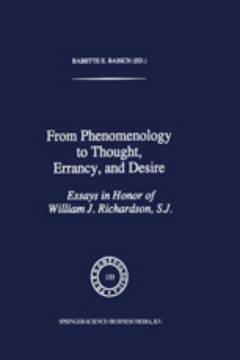Repository | Book | Chapter

(1995) From phenomenology to thought, errancy, and desire, Dordrecht, Springer.
Wise people, one of Kafka's narrators claims, don't talk like the rest of us. Even when they do talk like us, it is only in metaphors or parables. "If a wise person says, Go over there!," the narrator complains, "she doesn't mean that we should just go to the other side of the road. Instead, she means that there is something wonderful over there, something that we do not yet know about and that we cannot yet fully describe...."2 Poets, Heidegger says, don't talk like the rest of us either. They don't talk in parables, but in new tongues, new languages, in new vocabularies, more like the oracles of the gods. Van Gogh's famous painting of a peasant's shoes may have let us see the shoes more fully, but poets do more: they "disclose" the world. The poet, Heidegger claims, "lets truth itself originate."' Psychoanalysts, Lacan tells us, do not simply uncover biological memories or chronological facts. They do not even discover psychological realities as such. Rather, "in psychoanalytic anamnesis, it is not a question of reality, but of truth, because the effect of full speech is to reorder past contingencies by conferring on them the sense of necessities to come, such as they are constituted by the little freedom through which the subject makes them present."4 In this essay, I want to explore the possible relation of the Lacanian notion of "full speech" to Heidegger's notion of truth as disclosure. I would also like to show why "empty speech" destroys this "little freedom" and why full speech depends on it. To do so, however, requires going beyond both Heideggerian and Lacanian notions of linguistic communication and of freedom. What I want to emphasize is the transformative effect of full speech that is absent in empty speech, an effect that can be on both the individual-biographical and the social-cultural levels.
Publication details
DOI: 10.1007/978-94-017-1624-6_23
Full citation:
Bohman, J. (1995)., On empty and full speech: intelligibility and change in the public world, in B. Babich (ed.), From phenomenology to thought, errancy, and desire, Dordrecht, Springer, pp. 355-371.
This document is unfortunately not available for download at the moment.


